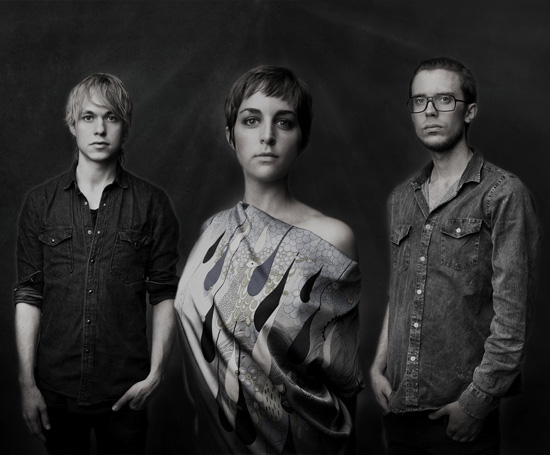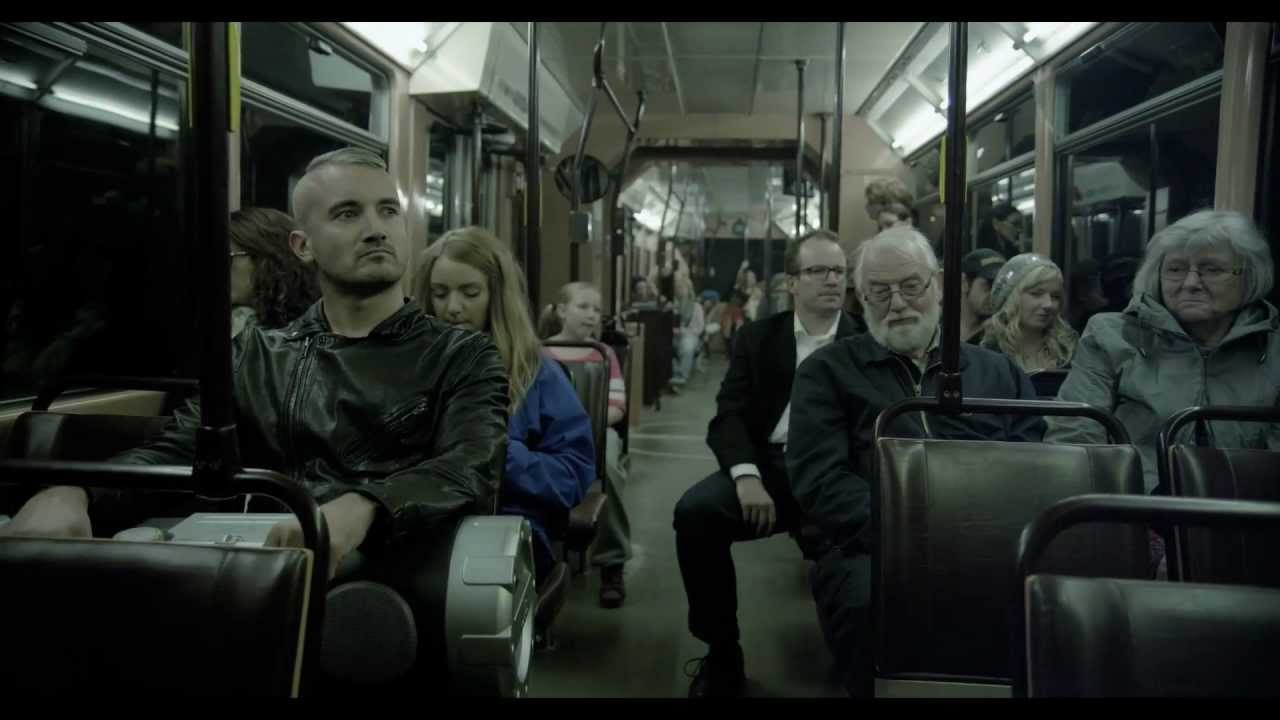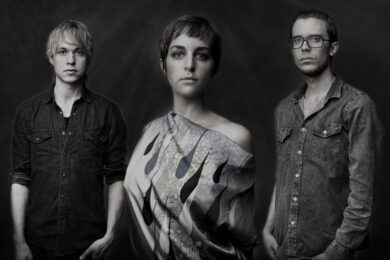The first time I saw PELbO, they were playing to a roomful of people who were, on average, about four times their age. It was a silent, seated crowd at Kings Place in November 2011, come to watch what many probably assumed was going to be jazz. It was the London Jazz Festival, after all. And after a few songs, several couples – some aided by walkers or canes, leaning on one another for support – walked out. It was the Norwegian trio’s live debut in London, but it was far from the first time they’ve taken the stage for a jazz festival. Which, no matter how often they do it, never becomes any less weird.
Though vocalist Ine Kristine Hoem, tubist Kristoffer Lo and drummer Trond Bersu met as jazz conservatory students to form PELbO in 2006, all three would end up shedding those labels in order to bring the improvisatory spirit of their training to the world of electro-pop. They’ve remained a consistent presence on the Norwegian jazz scene despite that fact – perhaps only because of Lo’s tuba, which, ironically, he washes in so many effects that it often sounds more like a synthesizer – but, as they mature, now face an identity crisis that may force them to step more fully into the mainstream in order to escape the ire of traditionalist jazz critics.
With the release of their second record, Days of Transcendence, in late 2011, PELbO seem to finally feel comfortable within compositions equally hooky and ethereal. And as they continue to embrace and shrink the gap between the brassy and the digital, as well as reaching for new audiences outside Norway, the trio looks to reconcile their very different past with an equally unpredictable future. The Quietus met Hoem and Lo at the Anker Hotel in downtown Oslo to talk about how the trio’s sound developed, and how they might take the next step forward.
When, as a group, did you decide to turn away from jazz, and what caused that shift?
Ine Kristine Hoem: Kristoffer and I were developing our own duo into a trio after meeting Trond, and at that point it was acoustic, just a groove, and it was diatonic – all the songs were in the same key. It was just the same scale, up and down. And then I started using a loop for my vocals at our first concert. We just played one of older songs, a rock-ish song with a little more attitude and louder vocals. It was new for me, but we liked that sound. So we started doing the loop stuff, and that was our main focus at the beginning, just playing on that loop: me looping, them playing. We didn’t think about the songs so much, it was just like, ok, how can we put the loop into this band? That’s really where the shift began towards the pop sound.
Kristoffer Lo: The songs didn’t have that much focus in the early days. I really had to have a talk with myself just to realize, ok, I don’t just want to play jazz and groove stuff. I want to play pop, composed songs, and write stuff like that. And once I acknowledged that, I started trying to bring bits of it into this band.
IKH: It was pop, but it was still experimental, the first music we were writing.
Having heard new material, like Days of Transcendence, would fans of yours even recognize that earlier sound?
IKH: You would just hear that it was an immature band. Like a band that wasn’t finished – because the sound was quite thin, and my voice was quite thin. I had a major problem with my voice at that time. My technique wasn’t good at all, and I was more used to singing jazz, so after each rehearsal I was so sore. Both Trond and Kristoffer wanted to get the volume up, saying: ‘Come on, let’s play a little bit louder,’ and my voice was like, I can’t do it, I want to sing quiet and jazzy. But they continued to push, and Kristoffer, I don’t remember when, but then you came with your pedals.
KL: Yeah, distortion and octave pedals. There wasn’t really a time when we actually said: ‘Now we’re going to do this.’ I just started bringing them. We did one recording prior to the first album, one that we never released, but it was important because it was the first time I played with some distortion on my tuba. And we had big arguments in the studio over that, especially between me and Ine, thinking that maybe it just sounded stupid, that the distortion didn’t have any effect at all. But it ended up becoming really important to how we could distinguish ourselves.
You’ve basically ripped the tuba out of its traditional context by using it more as a distorted, electronic sound system than a brass instrument. What first made you approach the tuba in that way?
KL: One of the main things about PELbO is that after a couple of years, we’ve started to appreciate our backgrounds more. I grew up listening to the Beatles, as well as Marilyn Manson, Korn, stuff like that. And I’ve always played guitar in rock bands, running around and jumping onstage and all that. So after studying jazz for four years, I just realized, man, my heart is much more in rock than in the jazz world.
So it’s basically that: I wanted to do the same thing with a tuba as I did with a guitar. It’s kind of fucking stupid to do it with 16 kilos on my back, but I decided I had to figure out a way to do that. And luckily I had these guys who, after the initial arguments, really appreciated it, and said, let’s try to develop this into something unique. Then it was just a matter of bringing in more and more effects pedals. I want to be something between guitar and tuba, because we’re just a trio and we need to fill the space.
Considering all that, was it at all uncomfortable to make your first live appearance in London at a massive jazz festival, rather than for listeners who might be more likely to approach your music?
IKH: No, not really. We’re quite used to it by now, actually. Of course, I would choose a rock festival over a jazz festival, and people drinking and having fun over people sitting, since it’s such an adrenaline kick. But of course, like in Norway, we’ve gone through the jazz scene and used that to move into the rock scene. And the jazz audience is, I think, much more open. But no, I don’t agree with that.
KL: You disagree with yourself. [laughs]
IKH: The rock audience is also open, but I think our way to a bigger audience is at the jazz festivals first. You know, we start at the jazz festivals, and then maybe someone will hear us.
KL: And coming onto the stage in London, I knew what kind of band had played prior to us – a kind of standard jazz-fusion group – so I felt really eager to go onstage in that situation. I was thinking: ‘Oh, we’re gonna show you now, motherfuckers.’
But Ine, do you ever still think of yourself as a jazz vocalist? One thing I’ve noticed about you, especially on Days of Transcendence, is that your phrasing really recalls that style.
IKH: The thing is that I know I can’t move away from my jazz background. I’ve listened too much to jazz vocalists, and I’ve copied them too many times, to be able to do that. I can never go back to being a singer who hasn’t studied this stuff. That’s usually the difference between the pop vocalist and the jazz vocalist. The pop vocalist has been singing all the time, and they’re just good at singing, but they don’t have this idea of what they’re doing, they just want to have their own expression.
For me it’s like craftsmanship. Of course I want to sound like me, but I think I do that anyway. I don’t only think of it as art, I want to push my voice and see what it is possible to do. If I can combine the jazz stuff with people like Bjork or PJ Harvey, if I can combine those styles into something that’s different, that’s what I want. I want to do every genre, really.
So you’d say that, for all of you, it’s about joining a different stylistic tradition, rather than just leaving one behind.
KL: Well, come on, it’s a tradition for rock and jazz musicians to meet anyway. It may not be the old jazz tradition itself, but it’s been happening since the ‘60s and ‘70s, so there’s nothing new at all about that. And we’ve never said that this is jazz. Critics sometimes complain about our presence in certain places, and sometimes people walk out, but that’s not our problem. When we’re booked to jazz festivals and jazz venues, we just play our stuff. If some guy thinks that this is, like, a disgrace to the jazz tradition just because we’ve played there, then okay, whatever.
But one thing that you may need to borrow from the jazz tradition is the spirit of re-invention that characterized so many of those musicians. Are you ever, at this point, conscious of the idea that the voice-tuba-drums sound might become predictable or too limiting for electro-pop in the long term?
IKH: Well the thing is, when we made the shift from jazz to pop, we started out thinking a lot about the band and the sound. Now we’re thinking about the songs and the compositions. The band is okay now; we know what we’re doing. So I don’t think that the next album will be at all similar to this one. We were thinking about doing something completely different. Maybe we can have a choir. Maybe we can do else something that’s different – not for the audience or the critics or any sense of tradition, but for ourselves, just in order to develop.




